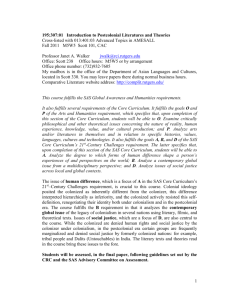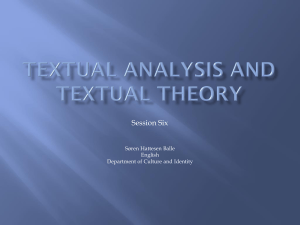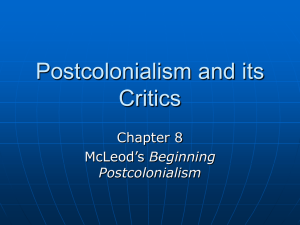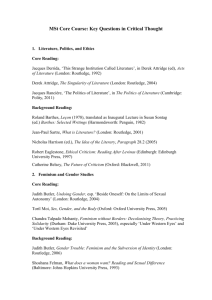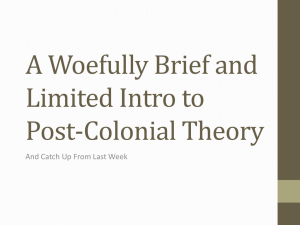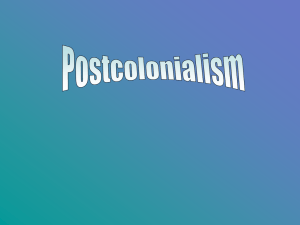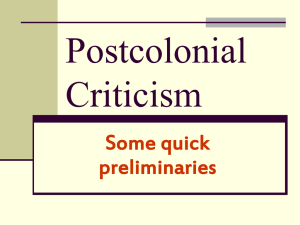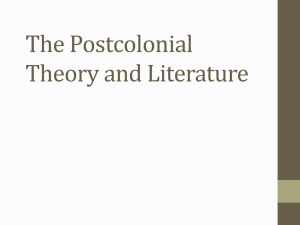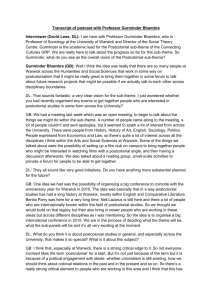Introduction to Postcolonial Literatures and Theories
advertisement
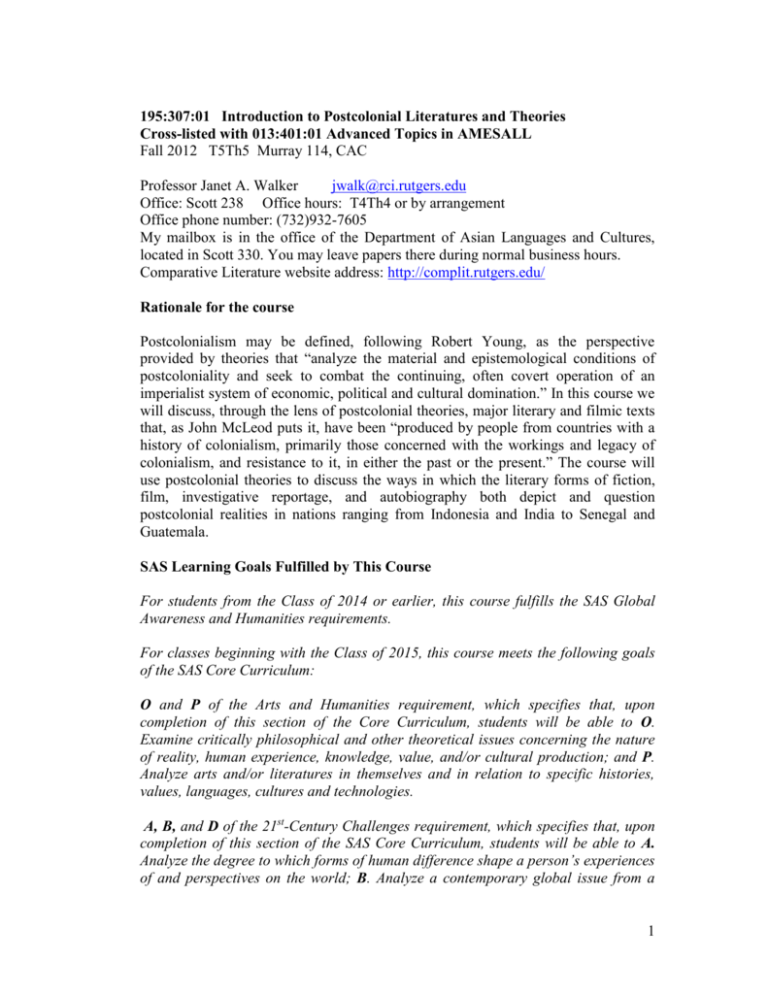
195:307:01 Introduction to Postcolonial Literatures and Theories Cross-listed with 013:401:01 Advanced Topics in AMESALL Fall 2012 T5Th5 Murray 114, CAC Professor Janet A. Walker jwalk@rci.rutgers.edu Office: Scott 238 Office hours: T4Th4 or by arrangement Office phone number: (732)932-7605 My mailbox is in the office of the Department of Asian Languages and Cultures, located in Scott 330. You may leave papers there during normal business hours. Comparative Literature website address: http://complit.rutgers.edu/ Rationale for the course Postcolonialism may be defined, following Robert Young, as the perspective provided by theories that “analyze the material and epistemological conditions of postcoloniality and seek to combat the continuing, often covert operation of an imperialist system of economic, political and cultural domination.” In this course we will discuss, through the lens of postcolonial theories, major literary and filmic texts that, as John McLeod puts it, have been “produced by people from countries with a history of colonialism, primarily those concerned with the workings and legacy of colonialism, and resistance to it, in either the past or the present.” The course will use postcolonial theories to discuss the ways in which the literary forms of fiction, film, investigative reportage, and autobiography both depict and question postcolonial realities in nations ranging from Indonesia and India to Senegal and Guatemala. SAS Learning Goals Fulfilled by This Course For students from the Class of 2014 or earlier, this course fulfills the SAS Global Awareness and Humanities requirements. For classes beginning with the Class of 2015, this course meets the following goals of the SAS Core Curriculum: O and P of the Arts and Humanities requirement, which specifies that, upon completion of this section of the Core Curriculum, students will be able to O. Examine critically philosophical and other theoretical issues concerning the nature of reality, human experience, knowledge, value, and/or cultural production; and P. Analyze arts and/or literatures in themselves and in relation to specific histories, values, languages, cultures and technologies. A, B, and D of the 21st-Century Challenges requirement, which specifies that, upon completion of this section of the SAS Core Curriculum, students will be able to A. Analyze the degree to which forms of human difference shape a person’s experiences of and perspectives on the world; B. Analyze a contemporary global issue from a 1 multidisciplinary perspective; and D. Analyze issues of social justice across local and global contexts. The issue of human difference, which is a focus of A in the SAS Core Curriculum’s 21st–Century Challenges requirement, is crucial to this course. Colonial ideology posited the colonized as inherently different from the colonizer, this difference interpreted hierarchically as inferiority, and the colonized renegotiated their identity through activities of resistance. In the postcolonial era, difference was marked by the distance between the elite classes, who inherited some of the power of the colonizers, and the rest of the people. The course fulfills the B requirement in that it analyzes the contemporary global issue of the lingering effects of colonialism on several nations. Issues of social justice, which are a focus of D, are also central to the course. While the colonized are denied human rights and social justice by the colonizer under colonialism, in some formerly colonized nations certain groups are frequently marginalized and denied social justice, for example: tribal people and Dalits (Untouchables) in India and indigenous peoples in Guatemala. The literary, filmic, and theoretical texts dealt with in the course bring these issues to the fore. Assessment Students will be assessed, in the final paper, following guidelines set out by the Core Requirements Committee and the SAS Advisory Committee on Assessment. Learning Goals of the Comparative Literature Program 1) Students will demonstrate familiarity with a variety of world literatures as well as methods of studying literature and culture across national and linguistic boundaries and evaluate the nature, function and value of literature from a global perspective. 2) Students will demonstrate critical reasoning and research skills and will write a clear and well developed paper or project about a topic related to more than one literary and cultural tradition. If they decide to major or minor in Comparative Literature, they will design and conduct research in an individual field of concentration (such as literary theory, women’s literature, postcolonial studies, literature and film, etc.). Learning Goals of the Instructor The course aims to develop the student’s capacity to think critically about postcolonial literatures in a comparative framework. Important issues that we will consider are the construction of nation and national culture, the role of education and language, and hybridity, gender, and the disenfranchised in the formation of colonial and postcolonial identities. It also aims to develop the student’s capacity to understand how the genres or forms in which writers treat postcolonial issues: in this 2 course fiction, autobiography, investigative reportage, and film, shape their representation of postcolonial realities and identities. By the end of the course students should have arrived at an understanding of how the postcolonial situation is represented and interrogated in texts from several areas of the formerly colonized world. Students should further have arrived at an understanding of how identities are formed in the context of class, gender, and ethnicity in the colonized and formerly colonized world. Finally, students should have gained the capacity to express their understanding of specific literary texts as postcolonial texts through class discussions and through the writing of two short papers and one longer comparative paper. Required readings to be purchased: the following five books for the course listed below are available for purchase at the Barnes and Noble Bookstore at Rutgers University (100 Somerset Street). Feel free to order them online, but if you do, be sure to order them using the ISBNs that I have given below. Please note that we will be reading the second editions of the first title (Loomba) and the fifth title (Menchú). If you buy the first editions of these books, the content will be different and the page numbers will not coincide with those of the second edition. 1) Ania Loomba. Colonialism/Postcolonialism, 2nd edition 2005. Routledge. ISBN #978-0415350648 2) Pramoedya Ananta Toer. Translated by Max Lane. This Earth of Mankind Penguin Books. ISBN#978-0140256352 3) Ousmane Sembène. Xala. Translated by Clive Wake. Chicago Review Press, Lawrence Hill Books ISBN#978-1556520709 4) Arundhati Roy. The God of Small Things. Random House. ISBN #9780812979657 5) Elisabeth Burgos-Debray, ed. and introd. I, Rigoberta Menchú: An Indian Woman in Guatemala. Translated by Ann Wright. 2nd edition 2010. Verso. ISBN#978-1844674183 All other readings for the course are available on Alexander Online Reserve, under my name. In addition, the film Xala, directed by Ousmane Sembène, with subtitles, will be shown. Course format When a book to be purchased is assigned, its title is marked with an asterisk in the syllabus. Students should bring to class a copy of each required book on the day that it will be discussed. If a required text that is assigned is not marked with an asterisk, it is to be found on Alexander Online Reserve. Please note that some of the readings on reserve are historical or theoretical background materials and some are literary texts that will be focused on in class. 3 Course procedures Please be sure to have purchased or ordered (and received) all required books for the class by the time they are needed. And please bring all relevant materials from Alexander Online Reserve in Xeroxed form to class on the day they are needed. I indicate in the syllabus which reserve readings students should bring to class. Students are not allowed to have an online copy of the text in class—it should be in print form of some kind, i.e., either a book or a Xeroxed document. Use of electronic devices Please note that computers, cell phones, and all other technological devices (beepers, iPods, MP3 players, etc.) must be turned off during class out of respect for the instructor and fellow students. This is an interactive course that demands your attention and participation. SYLLABUS *Please note: in the syllabus, only the author, the title, and the page numbers of a reading are given; complete references to the texts, which students will need in preparing a Works Cited section for each paper, are to be found under the author’s name in the Bibliography. Tues. Sept. 4 Introduction to course syllabus, content, and format Thurs. Sept. 6 What is postcolonialism? What is colonialism and what is the “post” in the term postcolonialism? Readings: 1) Ania Loomba, *Colonialism/Postcolonialism: “Chapter One: Situating Colonial and Postcolonial Studies,” pp. 7-24 (through top paragraph). 2) Aimé Césaire, “From ‘Discourse on Colonialism,’” pp. 172-180. [bring to class] 3) Bouda Etemad, Possessing the World: “Introduction,” pp. 1-7. ****Indonesia Unit**** Tues. Sept. 11 Introduction to colonialism and postcolonialism in Indonesia Reading: Bouda Etemad, Possessing the World: “The Dutch Domain: From the Trading Empire to the Java War,” pp.148-151; “Java and the Cultivation System,” pp.161-163; “The Creation of the Dutch East Indies,” pp.172-173. Thurs. Sept. 13 Orientalism: a western way of constructing the non-Western world Readings: 1) Edward Said, Orientalism, pp. 1-13, 201-211. [bring to class] 2) Pramoedya Ananta Toer, House of Glass (the final volume of the “Buru Quartet,” 1980-88): sections on Meneer L______, pp. 58-61, 68-71, 77-80, 114- 4 115, 124-125, 176-177; and on Minke as cultural hybrid and the form of the Buru Quartet, 176-177. [bring to class] Tues. Sept. 18 Pramoedya Ananta Toer, This Earth of Mankind (the first volume of the “Buru Quartet”) Readings: 1) *This Earth of Mankind, Translator’s Note, pp. 9-12; Chapters 1-5 (pp. 9-103). 2) Ania Loomba, *Colonialism/Postcolonialism: “Constructing Racial and Cultural Difference,” pp. 91-106. 3) Ann Laura Stoler, Carnal Knowledge and Imperial Power: the nyai, pp. 46-51, 68, 180. [bring to class] Thurs. Sept. 20 Colonial education in *This Earth of Mankind Readings: 1) *This Earth of Mankind, Chapters 6-9 (pp. 104-168). 2) Loomba, *Colonialism/Postcolonialism, pp. 75-80. 3) Sanjay Seth, Subject Lessons, pp. 1-5, 197-198, 17-19, 26-31, 42-45. [bring to class] 4) Thomas Babington Macaulay, “Minute on Indian Education,” pp. 428-430. [bring to class] Tues. Sept. 25 The Buru Quartet”: a historical novel of the rise of Javanese nationalism Readings: 1) *This Earth of Mankind, Chapters 10-16, pp. 169-284; Afterword (Max Lane), pp. 361-363. 2) Benedict Anderson, Imagined Communities, pp. 1-7, 30-36. Thurs. Sept. 27 This Earth of Mankind as a critique of the legal and religious status of the indigenous people under Dutch colonialism Readings: 1) *This Earth of Mankind, Chapters 17-20, pp. 285-359. 2) Laura Ann Stoler, Carnal Knowledge and Imperial Power, pp. 101-106. Tues. Oct. 2 Concluding discussion of This Earth of Mankind: Colonial education versus traditional Javanese education; the novel as a fable and an allegory ****India unit**** Thurs. Oct. 4 Introduction to colonialism and postcolonialism in India Readings: 1) Anshuman Mondal, “South and East Asia,” pp. 139-141, 144-150. 2) Máire Ní Fhlathúin, “The British Empire,” pp. 25-31. 3) Barbara Harlow and Mia Carter, ed. and introd., “The British East India Company,” pp. 4-7. [bring to class] 5 **First short take-home exam due Tues. Oct. 9 Literature of the postcolonial disenfranchised I—tribal people Readings: 1) Gayatri Chakravorty Spivak, “The Author [Mahasweta Devi] in Conversation,” pp. ix-xxi. 2) Arundhati Roy, Walking with the Comrades, pp. 38-45, 122-123, 1643-175, 208214. 3) Ania Loomba, *Colonialism/Postcolonialism, pp. 13-16, 165-170. Thurs. Oct. 11 Literature of the postcolonial disenfranchised: Mahasweta Devi, “Draupadi’ (1978) Readings: 1) Gayatri Chakravorty Spivak, “Draupadi: Translator’s Foreword,” pp. 1-18. [bring to class] 2) Mahasweta Devi, “Draupadi,” pp. 19-38. [bring to class] [1 and 2 are to be found together on Alexander Online Reserve] Tues. Oct. 16 “Draupadi” and theories of the disenfranchised: concluding discussion Readings: 1) Abdul JanMohamed, “Between Speaking and Dying,” pp. 139-147. [bring to class] 2) Ania Loomba, *Colonialism/Postcolonialism: “Can the Subaltern Speak?” pp. 192-204. 3) Gayatri Chakravorty Spivak, “Can the Subaltern Speak” pp. 24-28. [bring to class] Thurs. Oct. 18 Literature of the postcolonial disenfranchised II—Dalits: Arundhati Roy, *The God of Small Things (1997) Today’s topic: India’s Dalits (Untouchables). Readings: 1) Broken People, pp. 1-10, 179-199. [bring to class] 2) Claude Markovits, ed., A History of Modern India, pp. 2-5, 461-462, 540-541 (on caste and untouchability). [bring to class] Tues. Oct. 23 The God of Small Things, hybridity, and mimicry—Velutha and Chacko Readings: 1) *The God of Small Things. Chs. 1-2. 2) Ania Loomba, *Colonialism/Postcolonialism: “Hybridity,” pp. 145-153. 3) Homi Bhabha, “Of Mimicry and Man,” pp. 85-92. [bring to class] 4) Homi Bhabha, “Signs Taken for Wonders,” 29-32. [bring to class] Thurs. Oct. 25 The Issue of Language in Postcolonial India Readings: 6 1) *The God of Small Things, Chs. 3-6. 2) Frantz Fanon, “The Negro and Language,” pp. 17-25, 30-33, 36-39. [bring to class] 3) Partha Chatterjee, “Nationalism As a Problem,” pp. 164-166. Tues. Oct. 30 Postcolonial India and women: Ammu, Mammachi and Baby Kochamma Readings: 1) *The God of Small Things, Chs. 7-11. 2) Ania Loomba, *Colonialism/Postcolonialism: “Feminism, Nationalism and Postcolonialism,” pp. 180-192. 3) Andrew Parker, Mary Russo, Doris Sommer, and Patricia Yaeger, “Introduction” to Nationalisms and Sexualities, pp. 6 (“George Mosse…”)—7 (“formerly ‘domestic’ roles”). [bring to class] Thurs. Nov. 1 Postcolonial India, nation, and national culture: Readings: 1) *The God of Small Things, Chs. 12-14. 2) Ania Loomba, *Colonialism/Postcolonialism: “Nationalism Nationalisms,” pp. 154-170. and Pan- Tues. Nov. 6 India: Gender and caste in postcolonial India Readings: 1) *The God of Small Things, Chs. 15-21. 2) Ania Loomba, *Colonialism/Postcolonialism: pp. 134-137. ****Sénégal unit**** Thurs. Nov. 8 Ousmane Sembène’s *Xala (1973) Readings: 1) Charles Forsdick, “The French Empire,” pp. 32-33, 37-38, 40-44. 2) *Xala, pp. 1-37. 3) David Murphy, “Africa: North and Sub-Saharan,” pp. 61-63, 64-68. 4) Tamara Sivanandan, “Decolonization and the Forging of Postcolonial NationStates,” pp. 54-63. [bring to class] **Second short exam due Tues. Nov. 13 Ousmane Sembène, *Xala and national culture Readings: 1) *Xala, pp. 1-76. 2) Frantz Fanon, “National Culture,” pp. 153-157. [bring to class] Thurs. Nov. 15 Gender in Xala Readings: 1) *Xala, pp. 76-103. 7 2) Kirsten Holst Petersen, “First Things First: Problems of a Feminist Approach to African Literature,” pp. 251-254. [bring to class] 3) R. Radhakrishnan, “Nationalism, Gender, and the Narrative of Identity,” pp. 7781. [bring to class] Tues. Nov. 20 (Thursday classes) Ousmane Sembène: Xala (film—1974) Thanksgiving Break (Thurs. Nov. 22-Sun. Nov. 25) Tues. Nov. 27 Ousmane Sembène: Xala (film). Topics for discussion: the differing possibilities offered by a novel versus a film, and the native language versus the colonizer’s language, in the context of postcolonialism. Reading: Ngugi wa Thiong’o,” The Language of African Literature,” pp. 285-290. ****Guatemala unit**** Thurs. Nov. 29 Introduction to colonialism and postcolonialism in Guatemala Readings: 1) Claire Taylor, “The Spanish and Portuguese Empires,” pp. 46-47, 48-53. 2) Claire Taylor, “Latin America,” pp. 120-125. Tues. Dec. 4 *I, Rigoberta Menchú (1983) Readings: 1) *I, Rigoberta Menchú. Translator’s Note, Introduction, Chs. 1-3, 7-8, 11, 14. 2) John Beverley, “The Margin at the Center: On Testimonio (Testimonial Narrative,” pp. 91-114. Thurs. Dec. 6 *I, Rigoberta Menchú Readings: 1) *I, Rigoberta Menchú, Chs. 15, 18-19, 22-23, 25, 29, 31, 33-34. 2) John Beverley, “Our Rigoberta? I, Rigoberta Menchú, Cultural Authority, and the Problem of Subaltern Agency,” pp. 427-447. Tues. Dec. 11 Wrapping it up: postcolonialism now Reading: Ania Loomba, *Colonialism/Postcolonialism: “Conclusion: Globalisation and the Future of Postcolonial Studies,” pp. 213-228. Fri. Dec. 14: 12 Noon (or Mon. Dec. 17: Noon) ***Final 5-7-page paper due (to be sent to me by email attachment) Requirements 1) Attendance. Students are expected to attend all classes and attendance will be taken at each class meeting. Each student is allowed two unexcused absences for the semester; exceeding that number will result in a lowering of the attendance and participation grade by one point for each absence. Religiously observant students 8 should indicate that they wish to be excused on religious holidays, and these absences will be considered excused absences, following university regulations. Athletes needing to attend practice or to take part in sport events at certain times should officially inform me of their absences; absences for these reasons will also be considered excused absences. Students should also let me know if they have transportation emergencies or scheduled job interviews, as these are also excused absences. Student Absence Reporting for health and other emergency absences. Under this system, students are responsible for reporting their health and other emergency absences on the Rutgers Self-Reporting Absence Website: https://sims.rutgers.edu/ssra/. If you expect to miss one or two classes for these reasons, please report your absence at this website. Long-term Absences. In cases where students must miss classes for periods longer than one week, they are directed to see the Dean of Students for assistance in notifying all of their professors. 3) Oral presentation and quizzes. This is an interactive class. Students are therefore expected to be ready to discuss the readings on the day for which they are assigned. Occasional quizzes will be given. In addition, each student will present a close reading of a passage from one of the literary texts from a list to be given out shortly after the semester begins. Presentations should last no more than ten minutes and will be graded on 1) the accuracy and originality of the close reading; 2) the organization of the presentation; 3) the extent to which the passage is read in connection with one or more of the theories assigned for that text; and 4) the quality of the delivery of the presentation (i.e., maintaining good eye contact with the audience, talking rather than reading off of a paper, etc.). If a student misses the day scheduled for their oral presentation for a legitimate reason (see under “excused absences”), they may make up the oral presentation at a later time. If a student misses the day scheduled for their oral presentation due to an unexcused absence, the student will not be allowed to make up the presentation. 4) Two short (3-4-page) take-home exams that apply one or two theories to one text. These will be due on Oct. 4 and Nov. 8. I will give out questions for these one or two class days before the exam is due. Exams may be either sent to me by email attachment or handed in in class on the due date. Late exams may be made up within two weeks of the due date. 5) One 5-7-page paper that applies one theory to two texts read in the course in a comparative fashion. This will be due on the final exam date scheduled for the course, which is Friday Dec. 14. But students may send me their papers at the latest on Monday Dec. 17. I will be handing out a list of suggested topics but I encourage students to propose their own topic for this paper. If this option is 9 chosen, a paragraph proposing the topic must be handed in by Dec. 4 at the latest. ***Note: All written work for the course should be typed in 12-point Times New Roman or equivalent, with margins of one inch on all sides. Give all papers a title, double-space them, number the pages, and staple the pages together. Proofread all papers to catch grammatical and spelling errors, and typos. Do not use sources outside of class readings. I will hand out a sheet of instructions, before the first takehome exam is due, on how to write a literature paper, another on how to do a close reading of a text, and another on how to quote from or refer to a text read in the course. Always include a Works Cited section at the end of your papers, though not necessarily on a separate sheet of paper. Follow MLA style and format (http://owl.english.purdue.edu/owl/resource/557/01/). In preparing your Works Cited, consult the Bibliography at the end of the course syllabus for full bibliographical information. Please note that an A-range paper explains and interprets the material in an original manner, with an original and cogently articulated thesis and applying at least one theory. A B-range paper explains and interprets the material adequately, but not exceptionally and applies at least one theory. Both A-range and B-range papers refer specifically to the text(s), by discussing specific incidents and by quoting from the text(s). A C-range paper clearly presents and summarizes ideas in the text(s) but has a weak argument and does not quote from the text(s) or apply at least one theory. A D-range paper presents an unclear argument or has no argument and neither deals specifically with the text(s) nor applies one theory. Grading Policy 1) 2) 3) 4) Attendance and participation 10% Oral presentation and quizzes 20% Two short (3-4-page) take-home exams 20% each=40% One 5-7-page comparative paper 30% Total ------------------------------ 100% Grading Rubric A 90-100 B+ 87-89 B 80-86 C+ 77-79 C 70-76 D 60-69 F 59 and below Policy on Plagiarism 10 Plagiarism can include using information from published materials (including the internet) without acknowledging the source, teaming up with a classmate to write papers, and having someone else write some or all of the paper for you. In this course I am interested in your ideas, in your work. If I should discover evidence of plagiarism, I will pursue it following the interim university regulations on academic integrity, which can be found at this website: http://academicintegrity.rutgers.edu/ “Plagiarism is the representation of the words or ideas of another as one’s own in any academic work. To avoid plagiarism, every direct quotation must be identified by quotation marks, or by appropriate indentation, and must be cited properly according to the accepted format for the particular discipline. Acknowledgment is also required when material from any source is paraphrased or summarized in whole or in part in one’s own words. (quoted from Interim Academic Integrity policy) Here is a plagiarism tutorial that students might consult: “Consult Don’t Plagiarize: Document Your Research!” For tips about how to take notes so that you don’t plagiarize by accident. http://www.libraries.rutgers.edu/rul/lib_instruct/instruct_document.shtml Policy on Disability Rutgers, the State University of New Jersey abides by the Americans with Disabilities Act of 1990, the Americans with Disabilities Act Amendments (ADAA) or 2008, and Sections 504 and 508 which mandate that reasonable accommodations be provided for qualified students with disabilities. Students with disabilities should contact their instructors early in the semester so that they can be provided with accommodations they may need. They should also register with the Office of Disability Services, which is located in the Kreeger Learning Center, 151 College Avenue, Suite 123, phone number 732-932-2848. Full disability policies and procedures are to be found at http://disabilityservices.rutgers.edu/ Bibliography Anderson, Benedict. Imagined Communities: Reflections on the Origin and Spread of Nationalism. Revised Edition. London and New York: Verso, 1991. Beverley, John. “The Margin at the Center: On Testimonio (Testimonial Narrative).” In De/Colonizing the Subject: The Politics of Gender in Women’s Autobiography. Eds. Sidonie Smith and Julia Watson. Minneapolis: University of Minnesota Press, 1992. 91-114. Beverley, John. “Our Rigoberta? I, Rigoberta Menchú, Cultural Authority, and the Problem of Subaltern Agency.” In Postcolonialisms:An Anthology of Cultural 11 Theory and Criticism. Eds. Gaurav Desai and Supriya Nair. New Brunswick: Rutgers University Press, 2005. 427-447. Bhabha, Homi. “Of Mimicry and Man.” In Homi K. Bhabha. The Location of Culture. London and New York: Routledge, 1994. 85-92. Bhabha, Homi. “Signs Taken for Wonders.” In The Post-Colonial Studies Reader. Eds. Bill Ashcroft, Gareth Griffiths, Helen Tiffin. London and New York: Routledge, 1995. 29-35. Broken People: Caste Violence Against India’s “Untouchables.” New York, Washington, London, Brussels: Human Rights Watch, 1999. Burgos-Debray, Elisabeth, ed. and introd. *I, Rigoberta Menchú: An Indian Woman in Guatemala. Trans. Ann Wright. 2nd English edition. London and New York: Verso, 2009. Césaire, Aimé. “From Discourse on Colonialism.” In Colonial Discourse and PostColonial Theory: A Reader. Ed. and introd. Patrick Williams and Laura Chrisman. New York: Columbia University Press, 1994. 172-180. Chatterjee, Partha. “Nationalism As a Problem.” In The Post-Colonial Studies Reader. Eds. Bill Ashcroft, Gareth Griffiths, Helen Tiffin. New York and London: Routledge, 1995. 164-166. Devi, Mahasweta. “Draupadi.” In Mahasweta Devi. Breast Stories. Trans. Gayatri Chakravorty Spivak. Calcutta: Seagull Books, 1997. 19-38. Etemad, Bouda. Possessing the World: Taking the Measurements of Colonisation from the Eighteenth to the Twentieth Century. Trans. Andrene Everson. New York and Oxford: Berghahn Books, 2007. Fanon, Frantz. “The Negro and Language.” In Frantz Fanon, Black Skin, White Masks (Peau noire, masques blancs, 1952] Trans. Charles Lam Markmann. New York: Grove Press, 1967. 17-40. Fanon, Frantz. “National Culture.” In The Post-Colonial Studies Reader. Eds. Bill Ashcroft, Gareth Griffiths, Helen Tiffin. London and New York: Routledge, 1995. 153-157. Forsdick, Charles. “The French Empire.” In The Routledge Companion to Postcolonial Studies. Ed. John McLeod. London and New York: Routledge, 2007. 32-45. 12 Harlow, Barbara and Mia Carter, “The British East India Company.” In Barbara Harlow and Mia Carter, ed. and intro. Imperialism and Colonialism: A Documentary Sourcebook. Malden, Mass. and Oxford: Blackwell Publishers, 1999. 4-7. JanMohamed, Abdul. “Between Speaking and Dying: Some Imperatives in the Emergence of the Subaltern in the Context of U.S. Slavery.” In Can the Subaltern Speak?: Reflections on the History of an Idea. Ed. Rosalind C. Morris. New York: Columbia University Press, 2010. 139-155. Loomba, Ania. *Colonialism/Postcolonialism. 2nd edition. London and New York: Routledge, 2005. Macaulay, Thomas Babington. “Minute on Indian Education.” In The Post-Colonial Studies Reader. Eds. Bill Ashcroft, Gareth Griffiths, Helen Tiffin. London and New York: Routledge, 1995. 428-430. Markovits, Claude, ed. A History of Modern India 1480-1950. Trans. Nisha George and Maggy Hendry. London: Anthem Press, 2004. Mondal, Anshuman. “South and East Asia.” In The Routledge Companion to Postcolonial Studies. Ed. John McLeod. London and New York: 2007. 139-150. Murphy, David. “Africa: North and Sub-Saharan.” In The Routledge Companion to Postcolonial Studies. Ed. John McLeod. London and New York: Routledge, 2007. 61-82. Ngugi wa Thiong’o. “The Language of African Literature.” In The Post-Colonial Studies Reader. Eds. Bill Ashcroft, Gareth Griffiths, Helen Tiffin. London and New York: Routledge, 1995. 285-290. Ní Fhlathúin, Máire. “The British Empire.” In The Routledge Companion to Postcolonial Studies. Ed. John McLeod. London and New York: 2007. 21-31. Parker, Andrew, Mary Russo, Doris Sommer, and Patricia Yaeger, “Introduction.” In Nationalisms and Sexualities. Eds. Andrew Parker, Mary Russo, Doris Sommer, and Patricia Yaeger. New York and London: Routledge, 1992. Petersen, Kirsten Holst. “First Things First: Problems of a Feminist Approach to African Literature.” In The Post-Colonial Studies Reader. Eds. Bill Ashcroft, Gareth Griffiths, Helen Tiffin. London and New York: Routledge, 1995. 251-254. Radhakrishnan, R. “Nationalism, Gender, and the Narrative of Identity.” In Andrew Parker, Mary Russo, Doris Sommer, and Patricia Yaeger, eds. Nationalisms and Sexualities. New York and London: Routledge, 1992. 77-95. 13 *Roy, Arundhati. The God of Small Things. New York: HarperCollins Publishers, 1997. Roy, Arundhati. Walking with the Comrades. New York: Penguin Books, 2011. Said, Edward W. Orientalism. New York: Pantheon Books, 1978. *Sembène, Ousmane. Xala. Trans. Clive Wake. Chicago: Lawrence Hill Books, 1976. Seth, Sanjay. Subject Lessons: The Western Education of Colonial India. Durham, N.C.: Duke University Press, 2007. Sivanandan, Tamara. “Anticolonialism, National Liberation, Postcolonial Nation Formation.” In The Cambridge Companion to Postcolonial Literary Studies. Ed. Neil Lazarus. 2004. 41-65. Spivak, Gayatri Chakravorty. “The Author in Conversation.” In Imaginary Maps: Three Stories by Mahasweta Devi. Trans. and introd. Gayatri Chakravorty Spivak. New York and London: Routledge, 1995. ix-xxi. Spivak, Gayatri Chakravorty. “Can the Subaltern Speak?” [radically abridged version] In The Post-Colonial Studies Reader. Eds. Bill Ashcroft, Gareth Griffiths, Helen Tiffin. London and New York: Routledge, 1995. 24-28. Spivak, Gayatri Chakravorty. “Draupadi: Translator’s Foreword.” In Mahasweta Devi, Breast Stories. Trans. Gayatri Chakravorty Spivak. Calcutta: Seagull Books, 1997. 1-18. Stoler, Ann Laura. Carnal Knowledge and Imperial Power: Race and the Intimate in Colonial Rule. Berkeley, Los Angeles and London: University of California Press, 2002. Taylor, Claire. “Latin America.” In The Routledge Companion to Postcolonial Studies. Ed. John McLeod. London and New York, 2007. 120-128. Taylor, Claire. “The Spanish and Portuguese Empires.” In The Routledge Companion to Postcolonial Studies. Ed. John McLeod. London and New York, 2007. 46-58. Toer, Pramoedya Ananta. House of Glass. Trans. Max Lane. New York: Penguin, 1992. Toer, Pramoedya Ananta. *This Earth of Mankind. Trans. Max Lane. New York: Penguin, 1990. 14 15
